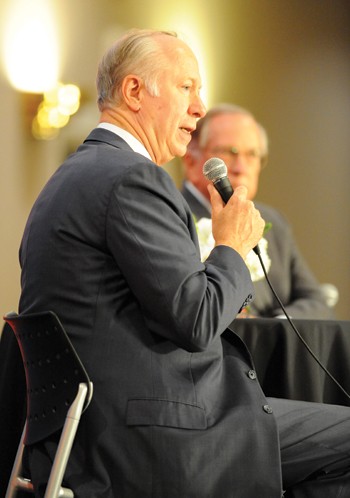
Former Secretary of State James A. Baker, III, speaks at the first Turner Construction/Wachovia Student Forum of the year yesterday afternoon. (Stuart Palley)
Yesterday, students, faculty and staff gathered in the Hughes-Trigg Forum and McFarlin Auditorium to engage in an intellectual discussion of domestic and foreign policy, current social issues and the upcoming election. The day’s events marked the beginning of the new Tate Lecture Series, and featured James Baker, Sam Nunn, and David Gergen.
In the afternoon, Gergen and Nunn led an interactive discussion with SMU students and those from neighboring high schools in a question and answer setting. Gergen opened a dialogue with Senator Nunn on topics ranging from the energy crisis to the possibility of a position on the new president’s cabinet.
The Forum was hosted by Turner Construction and Wachovia, and representatives of both organizations were present at the event. Nunn and Gergen both expressed their gratitude and excitement to speak with students at or near the college age, and acknowledged that the historically apathetic demographic was beginning to become more involved in the political scene, especially with the imminent McCain-Obama showdown.
Additionally, one of the most salient points made by these men during the Forum was that voters between 18 and 25 have been and should continue to be involved in politics in any way they can, no matter who their vote is cast for.
As can be expected, students pressed the men on their opinions of the pre-election polls, but Gergen and Nunn remained neutral and insisted that, political views aside, they are glad that the media is truly hyping up the election and therefore indirectly causing voter turnout to increase.
The evening’s discussion between Baker and Nunn was moderated by Gergen and allowed for a brief question and answer period at the end of the lecture. The speakers focused primarily on the need for bipartisanship in the new president’s term, especially if McCain wins the election and Americans are faced with another term of divided government.
Both Nunn and Baker emphasized that it is vitally important for both parties to come together to enact new legislation and make progress on major social and economic issues that will continue to affect more Americans every year, especially in the areas of Social Security and Medicare reform and the price of crude oil.
Also covered was the energy crisis, the failing housing market, nuclear weapon legislation reform, and America’s general lack of confidence in the global market in the midst of a serious economic recession. Questions posed at the conclusion of the lecture included a brief discussion of the benefits of term limits in the House and Senate, as well as the budget deficit.
The Tate line-up continues with Clark T. Randt, speaking about his experiences as ambassador to the People’s Republic of China on Sept. 30.








